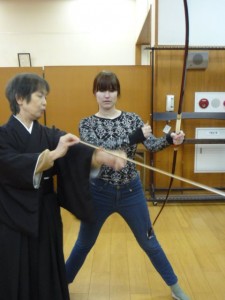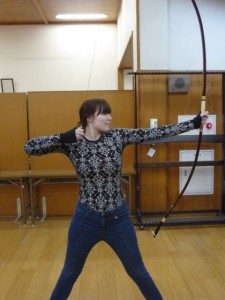My CIP for this semester was working as an English teacher’s assistant at a nearby middle school, Kamigyō Chūgakkō. Before my CIP began, I had visions of myself (through my profound and awe-inspiring teaching abilities) stirring a love of the English language in my students. My real experience was something quite different: thought quite enjoyable, it was definitely not what I expected.
For one thing, before volunteering at the school, I imagined Japanese schools to run like a well-oiled machine, populated by polite and serious students. Maybe this middle school is an exception to that rule, but it all felt a little chaotic. Still, the students were thrilled to see me every time I came and always made me feel welcome. As well, the teachers were quite kind and were passionate about teaching.
Another unexpected aspect of this experience was the manner in which I was employed. I helped out in the classroom about two or three times and the rest of the times I went, I simply talked with a group of the students for an hour or two. These kaiwa sessions were successful to various degrees: one time it was a large group of both boys and girls and so the conversation flowed quite well; another time it was just three shy girls and I almost had to drag the conversation out of them. Contrary to my visions of greatness, while there were a few students who did love English (for which I sadly cannot take credit), the vast majority seemed simply to be suffering through the class.
Kamigyō Chūgakkō
Moreover, I was a little disappointed that I couldn’t work in the classroom more often or in a more academic manner with the students. While conversational skills are important, the conversations sometimes devolved into me making small-talk and the students answering just “yes” or “no,” which doesn’t do much for their language abilities. I think using the volunteers in a more structured and academic manner (such as short individual sessions to address a particular student’s concerns or weaknesses) would be a better use of everyone’s time. However, the conversations (when they extended beyond me making small-talk) were a lot of fun and taught me some fun Japanese slang when the students wanted something translated into English.
If a KCJS student’s goal for their CIP was to interact deeply with Japanese people, I would probably not recommend a volunteer English assistant position to them. I did learn a lot about Japanese schools and youth, but I felt more like an outsider looking in than a part of the society itself. As well, since you are teaching English (and I was asked to stick to only English when talking to the students), there aren’t many chance to practice Japanese. To better integrate and become a member of Japanese society, I think it is important to speak the language and develop deeper relationships with Japanese people which is, unfortunately, difficult to do when you are interacting solely in English and with people who are much younger than you.
However, I did feel that I was able to get a glimpse into Japanese society and I think that by interacting with the Japanese students and allowing them to interact with a non-Japanese person, I was able to make a small impact on Japanese society. No matter what country it is, I think interacting with people from other countries not only gives you a wider, more global perspective, but also enriches that nation’s culture.
All in all, I really enjoyed this experience. To better integrate in Japanese society, I would advise supplementing volunteering as an English assistant teacher with activities that have to do with Japanese culture and language (KIX is a good option for this!). However, I found this CIP very fulfilling; it felt nice to know that I may have furthered someone’s interest in English or at least offered them a new experience. It was definitely a new experience for me, so I guess they taught me something too!



